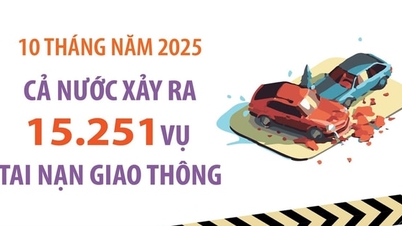Chronic kidney disease is a condition in which kidney function declines over time. As a result, the kidneys become less able to remove waste and excess fluid. Without intervention, the disease can progress to kidney failure.
Diabetes, heart disease, and high blood pressure increase the risk of chronic kidney disease. In the early stages, chronic kidney disease often does not cause any symptoms. Over time, the patient will begin to experience symptoms such as fatigue, itchy skin, weight loss, nausea, and swollen legs, according to the health website Medical News Today (UK).

Swollen feet are a common symptom of chronic kidney failure.
Chronic kidney disease will go through the following stages:
Phase 1
Because it is still in the early stages, the kidneys only have some minor damage and no symptoms. The glomerular filtration rate (GFR) is 90 or higher. When kidney disease is detected in stage 1, the doctor will recommend some measures to prevent the disease from progressing, such as maintaining a healthy weight, and people with diabetes need to control blood sugar.
Phase 2
In stage 2 of chronic kidney disease, the patient usually has no symptoms and the kidney damage is still mild. At this time, the glomerular filtration rate will decrease to 60 to 90. This is a sign that kidney function has slightly decreased.
Your doctor may prescribe certain medications to slow the progression of the disease, such as blood pressure medications and cholesterol control medications. This will help protect kidney function. Patients are also advised to limit protein intake and exercise regularly.
Phase 3
The glomerular filtration rate in this stage will be 30-59, which means that kidney function has decreased to a moderate level. Many patients may not have symptoms, while others feel back pain, swelling of the hands and feet, and increased or decreased urine output.
Patients need to see a kidney specialist and take certain medications as prescribed by the doctor. They also need to see a nutritionist to know which foods to avoid and which to eat.
Phase 4
The GFR at this stage is 15-29. Kidney function has been severely reduced and is often the last chance to preserve some of the remaining kidney function. The patient will experience symptoms such as back pain, chest pain, shortness of breath, nausea, muscle cramps, difficulty sleeping, itchy skin, swelling of the legs and some other symptoms. The patient will be recommended for dialysis or kidney transplant.
Stage 5 kidney failure
Kidney function has been severely impaired. The patient must undergo continuous dialysis. The body shows many symptoms due to internal organ poisoning. At this point, the patient needs a kidney transplant, according to Medical News Today .
Source: https://thanhnien.vn/benh-than-man-tinh-tien-trien-qua-nhung-giai-doan-nao-185241127121534822.htm














![[Video] Hanoi Oncology Hospital receives Second Class Labor Medal](https://vphoto.vietnam.vn/thumb/402x226/vietnam/resource/IMAGE/2025/11/08/1762561557241_img-2021-9778-png.webp)























![[Video] Hue Monuments reopen to welcome visitors](https://vphoto.vietnam.vn/thumb/402x226/vietnam/resource/IMAGE/2025/11/05/1762301089171_dung01-05-43-09still013-jpg.webp)


































































Comment (0)